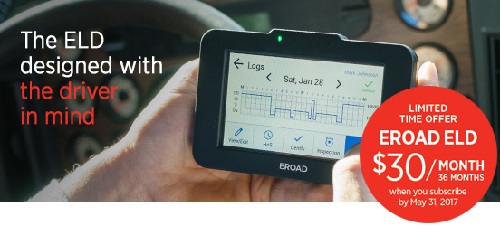Is your RFP built to source the right ELD solution?
By Gail Levario
Vice President Strategy and Market Development
EROAD
Often times a Request for Proposal (RFP) is the primary document sent to vendors that invites them to submit a proposal to provide goods or services. One of the main benefits that can arise if the RFP process is handled well is that it encourages vendors to submit organized proposals that can be evaluated using a quantifiable methodology.
Let’s take a look at key considerations to ensure your RFP is built to source the right Electronic Logging Device (ELD) solution. Keep in mind that unlike other purchases you’ve probably made in the past, this one does have an actual time limit. By December 2017, all CDL drivers required to keep a Record of Duty Status (RODS) must use an ELD to document their compliance with Hours of Services (HOS) rules.
WHAT SHOULD I LOOK FOR IN A VENDOR?
Is the provider of a prospective solution for your ELD offering something that is accurate and reliable? You need to be able to trust, come audit time, that you’ve captured everything required to comply with the ELD mandate, and that you’ve not been left high and dry by your technology. An unreliable device or system will waste your time and put you at risk during an audit. Closely related to accuracy is up-time. In other words, how many minutes each month can you expect the service to be working – or not working? Check that the vendor is transparent about uptime and accuracy.
You are well advised to check into other aspects of vendor reliability as follows:
•What steps has the vendor taken to ensure its ELD is compliant with the FMCSA rule?
•Does the vendor have a substantial number of customers?
•Can the vendor offer testimonials from their top customers?
•Does the vendor have a history of success?
•Can the vendor document financial stability?
•Can the vendor assure you they will be around in the future?
•Will the vendor continue to provide positive service after the sale?
WHAT QUESTIONS SHOULD I ASK?
The technology you install in a truck should last at least as long as the vehicle itself. The technology world moves incredibly quickly, so ask if the company you’re considering uses the latest technology. Legacy systems that haven’t kept up with technology trends can slow the vendor – and you – down. Find out how often a company releases software updates.
| Companies that have regular product updates – perhaps as often as every month – show that their technology is built for future needs, and that they respond to customer pain points. And do they provide over-the-air software upgrades free as part of the service, or are they an additional cost? It’s worth finding out how much a company spends on research and development, too. |
 |
The only technology companies that thrive are those that constantly innovate, so a company should be happy to share what it spends on R&D. If the company is publicly listed, that information will be freely available any way.
Example of an ELD compliant product
With this in mind, here are the Top 10 RFP questions you should ask about an ELD before you buy:
1. Does the ELD solution include driver communication capability?
2. Does it come with documentation including cab-cards and manuals?
3. Does the vendor technology platform offer driver performance metrics that reduce fuel usage?
4. Does the product enhance your company safety profile by improving driver behaviors and reducing truck at fault accidents?
5. Does the product provide free GPS location tracking?
6. Does the product include IFTA and/or weight mile tax automated tax data collection and reporting?
7. Does the product provide for tracking maintenance work performed and forecasting upcoming maintenance service requirements?
8. Does the product accurately account for tax exempt miles?
9. Is there potential integration with your back office systems?
10. Does the vendor offer customer service support hours that meet your hours of business?
IN SUMMARY
When it comes to your ELD decision making process taking a considered but efficient approach to making sure your RFP is built to source the right solution is important. On the other hand, don’t procrastinate, panic or overcomplicate things - you and your team – as well as your customers – will be just fine!
Founded in 2000, EROAD is a global technology provider of operational, road use and fuel tax management and compliance solutions for the transportation industry. Headquartered in New Zealand with North American offices in Portland, Oregon, EROAD’s advanced technology set the standard as the first GPS-based service provider to offer a government-approved electronic tax reporting solution in North America. This highly accurate and reliable technology is trusted to meet the compliance need, including the 2017 FMCSA electronic logging device (ELD) mandate, of fleets worldwide. For more information, please visit
www.EROAD.com.
Article provided by EROAD, CTA Executive Circle Club Partner. For more information about EROAD, click here.
The views expressed in this article reflect the views of the author and do not necessarily reflect the views of the California Trucking Association.
